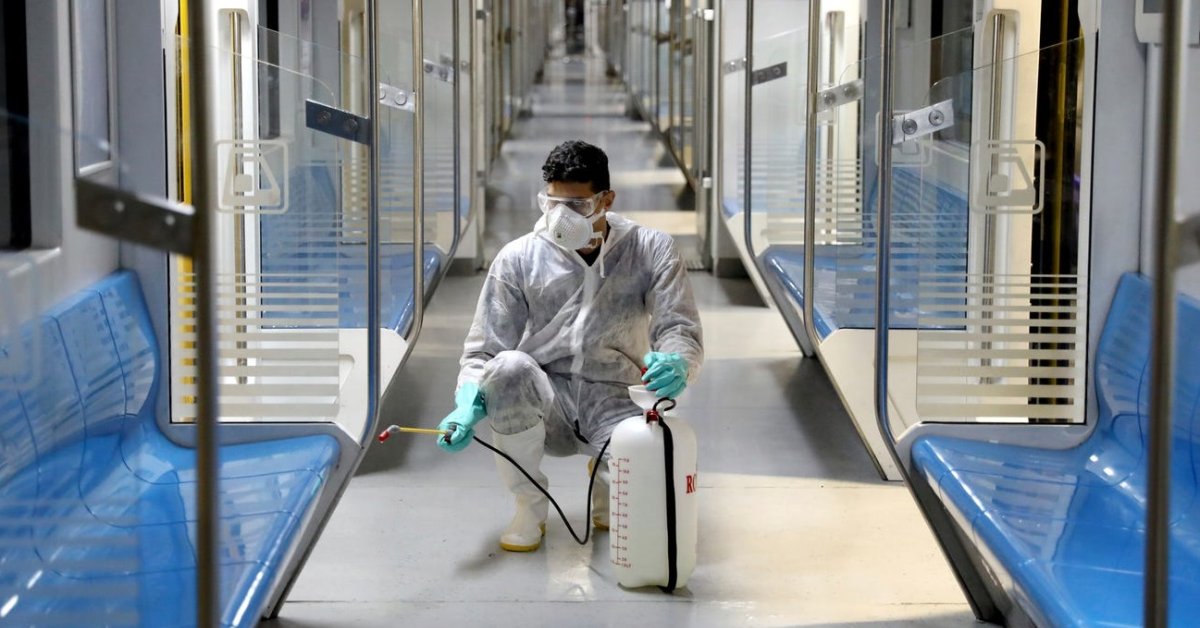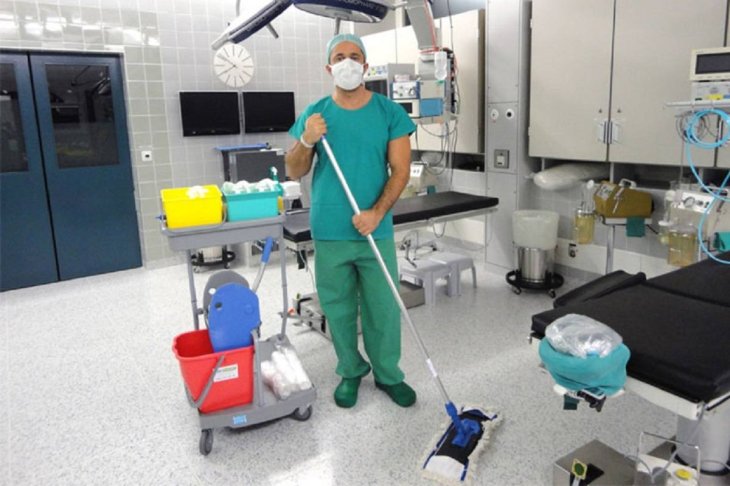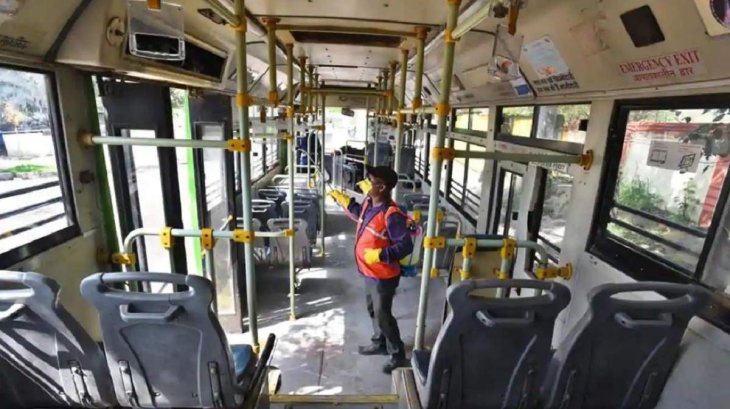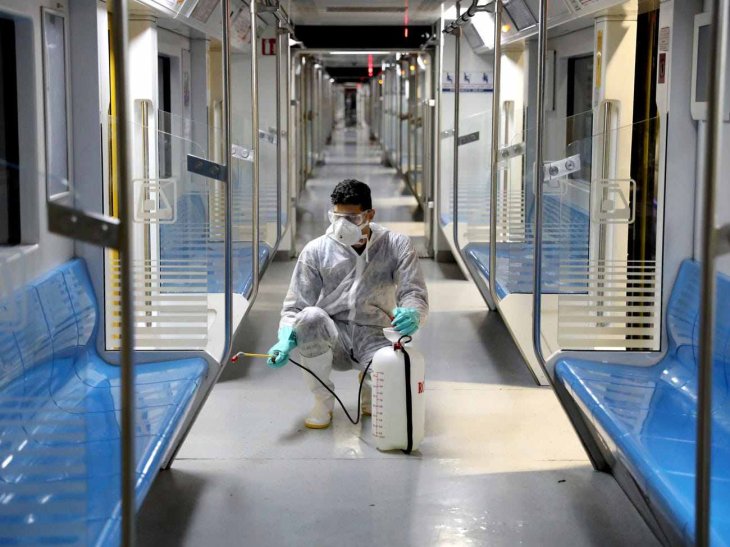IIT Guwahati Develops A Low-Cost Machine To Sanitize Hospitals And Buses Floors
Dhir Acharya - Apr 09, 2020

The IIT Guwahati team has developed a LED-based machine that’s not only cheap but also useful for disinfecting floors at hospitals, buses, and trains.
- Delhi Is The World’s Most Polluted Capital City For Three Years In A Row
- This Man's Super-Antibody Can Be Diluted 10,000 Times But Still Works Against COVID-19
- These Indian Cities Are Under Lockdown Again In 2021
The IIT Guwahati team has developed a LED-based machine that’s not only cheap but also useful for disinfecting floors at hospitals, buses, and trains to avoid SARS-CoV-2.
The team is also filing a patent for their disinfection machine that will be sold for Rs 1,000 when commercialized. For now, the machine prototype has to be manually operated, but they are working on a robotic machine that requires less human intervention.

The machine has been developed as requested by the Karnataka government and will be used in buses and hospitals in the state. It will be pitched for commercial use in other states too.
According to Senthilmurugan Subbiah, IIT Guwahati’s Associate Professor at the Department of Chemical Engineering, in the coming months, India will in a crucial need for public sanitization to prevent the spread of the ongoing pandemic. So far, disinfection in the country has been conducted on surfaces, open areas, and walls only, without a sanitization system for floors except for mopping them with an alcohol-based cleaner.

About the newly developed UVC system, Subbiah said that it can sanitize non-porous surfaces infected with microorganisms. For MS-2 Coliphase, a highly stable virus, the system can kill as much as 90 percent of the infection using 186 J dose while it requires 36 J dose to kill influenza virus that’s similar to SARS-CoV-2. He also said:
“The team has developed a UVC LED system capable of providing 400 J dose in 30 seconds, such that virus-infected surface will be sanitized. The unique design of this UVC system will ensure uniform exposure in virus-infected non-porous areas.”

The machine has undergone testing at the IIT Guwahati's lab, it can detect object movements to avoid affecting the human skin as it operates.
Subbiah additionally mentioned that the team is working with government agencies as well as industrial partners on developing other smart, low-cost techs to fight the pandemic.
As CO.VID-19 has infected over 5,000 thousand people in India and the number of confirmed cases as well as the death toll are going up quickly every day, we need machines like UVC and a lot more initiatives to protect people from the pandemic.
>>> Free CO.VID-19 Tests At Private Labs, India's Supreme Court Orders
Featured Stories

Features - Jan 29, 2026
Permanently Deleting Your Instagram Account: A Complete Step-by-Step Tutorial

Features - Jul 01, 2025
What Are The Fastest Passenger Vehicles Ever Created?

Features - Jun 25, 2025
Japan Hydrogen Breakthrough: Scientists Crack the Clean Energy Code with...

ICT News - Jun 25, 2025
AI Intimidation Tactics: CEOs Turn Flawed Technology Into Employee Fear Machine

Review - Jun 25, 2025
Windows 11 Problems: Is Microsoft's "Best" OS Actually Getting Worse?

Features - Jun 22, 2025
Telegram Founder Pavel Durov Plans to Split $14 Billion Fortune Among 106 Children

ICT News - Jun 22, 2025
Neuralink Telepathy Chip Enables Quadriplegic Rob Greiner to Control Games with...

Features - Jun 21, 2025
This Over $100 Bottle Has Nothing But Fresh Air Inside

Features - Jun 18, 2025
Best Mobile VPN Apps for Gaming 2025: Complete Guide

Features - Jun 18, 2025
A Math Formula Tells Us How Long Everything Will Live
Read more

ICT News- Feb 21, 2026
AI Coding Agent Causes Major AWS Outage at Amazon
In a striking example of the risks associated with deploying advanced AI in critical systems, Amazon Web Services (AWS) recently faced multiple outages attributed to its own AI coding assistants.

ICT News- Feb 20, 2026
Tech Leaders Question AI Agents' Value: Human Labor Remains More Affordable
In a recent episode of the All-In podcast, prominent tech investors and entrepreneurs expressed skepticism about the immediate practicality of deploying AI agents in business operations.

ICT News- Feb 19, 2026
Escalating Costs for NVIDIA RTX 50 Series GPUs: RTX 5090 Tops $5,000, RTX 5060 Ti Closes in on RTX 5070 Pricing
As the RTX 50 series continues to push boundaries in gaming and AI, these price trends raise questions about accessibility for average gamers.
Comments
Sort by Newest | Popular